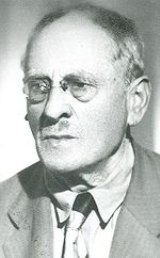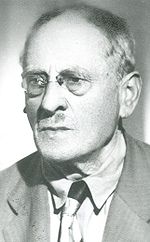
Oskar Rescher
Encyclopedia

Germany
Germany , officially the Federal Republic of Germany , is a federal parliamentary republic in Europe. The country consists of 16 states while the capital and largest city is Berlin. Germany covers an area of 357,021 km2 and has a largely temperate seasonal climate...
-Turkish
Turkey
Turkey , known officially as the Republic of Turkey , is a Eurasian country located in Western Asia and in East Thrace in Southeastern Europe...
scholar in Arabic
Arabic literature
Arabic literature is the writing produced, both prose and poetry, by writers in the Arabic language. The Arabic word used for literature is adab which is derived from a meaning of etiquette, and implies politeness, culture and enrichment....
, Persian
Persian literature
Persian literature spans two-and-a-half millennia, though much of the pre-Islamic material has been lost. Its sources have been within historical Persia including present-day Iran as well as regions of Central Asia where the Persian language has historically been the national language...
, and Turkish literature
Turkish literature
Turkish literature comprises both oral compositions and written texts in the Turkish language, either in its Ottoman form or in less exclusively literary forms, such as that spoken in the Republic of Turkey today...
who specialized in pre-Islam
Islam
Islam . The most common are and . : Arabic pronunciation varies regionally. The first vowel ranges from ~~. The second vowel ranges from ~~~...
ic Arabic poetry and Ottoman
Ottoman Empire
The Ottoman EmpireIt was usually referred to as the "Ottoman Empire", the "Turkish Empire", the "Ottoman Caliphate" or more commonly "Turkey" by its contemporaries...
studies. In 1903 he began to study law in Munich but soon changed to Oriental languages. After receiving his doctorate at Berlin
Berlin
Berlin is the capital city of Germany and is one of the 16 states of Germany. With a population of 3.45 million people, Berlin is Germany's largest city. It is the second most populous city proper and the seventh most populous urban area in the European Union...
in 1909 with a dissertation on the Arab grammarian Ibn Jinni he moved to Istanbul
Istanbul
Istanbul , historically known as Byzantium and Constantinople , is the largest city of Turkey. Istanbul metropolitan province had 13.26 million people living in it as of December, 2010, which is 18% of Turkey's population and the 3rd largest metropolitan area in Europe after London and...
to work in the libraries there. During World War I
World War I
World War I , which was predominantly called the World War or the Great War from its occurrence until 1939, and the First World War or World War I thereafter, was a major war centred in Europe that began on 28 July 1914 and lasted until 11 November 1918...
he served in the German army
German Army
The German Army is the land component of the armed forces of the Federal Republic of Germany. Following the disbanding of the Wehrmacht after World War II, it was re-established in 1955 as the Bundesheer, part of the newly formed West German Bundeswehr along with the Navy and the Air Force...
as censor for Arabic prisoner of war
Prisoner of war
A prisoner of war or enemy prisoner of war is a person, whether civilian or combatant, who is held in custody by an enemy power during or immediately after an armed conflict...
correspondence. After the war, he moved to Breslau and received his Habilitation and venia legendi (the right to hold lectures at a German university) from the University of Breslau. In 1925 he began teaching as professor (without full chair) at Breslau, but in 1928 he took a long-term leave and returned to Turkey. He left Breslau "for reasons that can no longer be determined but he evidently did so with resentment" (Berthold Spuler). Rescher also relinquished his membership in the Deutsche Morgenländische Gesellschaft
Deutsche Morgenländische Gesellschaft
The Deutsche Morgenländische Gesellschaft , in English the German Oriental Society, is a scholarly organization dedicated to studies of Asia and the broader Orient....
(DMG), the society of Oriental scholars in Germany. In due course he acculturated to the Turkish locale, changing the spelling of his name, and converting to Islam. For many years he was a staff member of the Islamic Institute of the University of Istanbul. There he spent the rest of his life, producing numerous scholarly studies and translating many texts into German. (He himself also wrote Oriental-style poetry in German.) Apart from keeping close contact with his Turkish colleagues and with Helmut Ritter, who was between 1926 and 1949 a semi-official representative of the DMG in Istanbul, Rescher lived a solitary life in his Istanbul house overlooking the Bosphorus, accompanied by many cats.
In 1933 the German Nazi government revoked his venia legendi and in 1937 he became a Turkish citizen. Most of his work appeared in small editions in Turkey but gradually made its way into the mainstream of European oriental scholarship. He devoted much effort over many years to build up a large collection of Arabic and Persian manuscripts. These now form the Rescher Manuscript Collection of the Berlin Staatsbibilothek as well as a collection at the Beinecke Rare Book and Manuscript Library at Yale University
Yale University
Yale University is a private, Ivy League university located in New Haven, Connecticut, United States. Founded in 1701 in the Colony of Connecticut, the university is the third-oldest institution of higher education in the United States...
. His extensive library of printed books in Arabic, Persian, and Turkish, as well as the secondary literature in European languages has been bought by the Ruhr Universität in Bochum (Germany) and forms the nucleus of the library of its Seminar für Orientalistik und Islamwissenschaften. The grandson of Oskar Rescher's cousin is Nicholas Rescher
Nicholas Rescher
Nicholas Rescher is an American philosopher at the University of Pittsburgh. In a productive research career extending over six decades, Rescher has established himself as a systematic philosopher of the old style and author of a system of pragmatic idealism which weaves together threads of...
, a well known philosopher who is also a scholar of Arabic and has made important contributions to the study of Arabic logics.
Oskar Rescher's publications include some valuable indices for works of classical Arabic literature like al-Bukhari's hadith-collection and Yaqut's Mu'jam al-buldan. He produced an Abriss der arabischen Literaturgeschichte, 2 vols. (Konstantinopel-Pera: Abajoli, 1925 and 1933, Reprint Osnabrück: Biblio-Verlag, 1983), as well as an extensive series of Beiträge zur arabischen Poesie, 8 vols. (Stuttgart and Istanbul, 1935–1963). Some of his publications are reprinted in: Gesammelte Werke: eine Sammlung der wichtigsten Schriften Oskar Reschers teilweise mit Ergänzungen und Verbesserungen aus dem schriftlichen Nachlass, 5 fasc. (Osnabrück: Biblio-Verlag, 1978–95).

